
Stolen Focus: Our Brains Online - The Reading List
There is a reasonable chance that you came to this reading list through a social medium. Now it's our job to keep your attention. We are going to do our best. There are so many distractions; from notifications on your phone, to another screen near you, that may also be screaming for attention. Every social medium wants to grab your attention and and keep you engaged for as long as possible. And social media companies are getting better at this every day through data collection. How will study and work change as a result of these developments? How does that impact society? And are there ways to protect yourself against it?
Paying real attention to a task, for longer than a few minutes, is a challenge for more and more people. Our brains are lazy, like varied stimuli, and companies gratefully take advantage of these facts to serve us as many advertisements as possible.
Whether you are looking for a book that helps you concentrate better through excercises or real-world examples, a book that explains how the modern attention economy works, or a book in which you can disappear into more and more unrelated but interesting anecdotes: this reading list is exactly what you're looking for.
All books on this reading are available in the collections of Leiden University Libraries and can be borrowed by following the link under the title of the book, or by searching for the title, author or theme in our Catalogue.
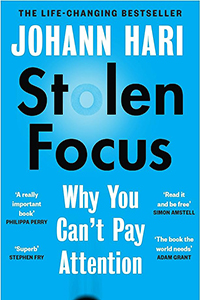
Johann Hari, Stolen Focus: Why You Can't Pay Attention
2022
When journalist Johann Hari discovered that he, his friends and family faced increasingly crippling problems with focusing and concentrating, he decided to go on a journey and find out the reasons (and possible solutions) for our attention crisis. Talking with scientists, doctors and experts from all over the world, he discovered just how real the attention crisis is. In the US, college students focus on one task for only 65 seconds, while office workers on average manage only three minutes. Our increasing inability to focus is not only affecting our studies and work, but also our personal lives, relationships and our ability to think critically.
The attention crisis is a societal crisis, explains Hari. It is caused by tech companies creating apps that claim our attention in order to push more ads, but also by work stress, air pollution, unhealthy diets, and disrupted sleep schedules. And although Hari discusses individual strategies to deal with these issues, he ultimately holds that a societal crisis requires a collective response. As individuals, and as a society, we can get our focus back, but only if we are determined to fight for it. Tackling our crippling attention crisis requires that we take action and demand a different outlook on health, work, food, child rearing and social media. This book explains the intensity and causes of our attention crisis, provides insights for individual responses and holds a collective call to action.
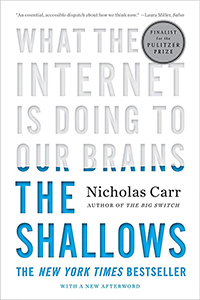
Nicholas Carr, The Shallows: What the Internet Is Doing To Our Brains
2010
The Shallows is a non-specialist book from some years ago. It shows how quickly books on the dangers of modern technologies become obsolete: the author is still speaking about BlackBerries! But it also reveals how discussions between champions and critics of innovations tend to be similar. Carr himself points to this, when he discusses Socrates’ scruples against the alphabet and when he cites a 17th century English censor who claimed that the invention of printing brought more evil then good. McLuhan’s media criticism from the sixties (The Gutenberg Galaxy (1962), Understanding Media (1964)) is a major inspiration for Carr. In McLuhan’s time, the telephone and the television were new and challenging. Carr focusses on the internet. He acknowledges the many plusses of the medium, but his starting point is negative:
“What the Net seems to be doing is chipping away my capacity for concentration and contemplation. […] Once I was a scuba diver in the sea of words. Now I zip along the surface like a guy on a Jet Ski.” And he adduces others who suffer from the same ailment. Bruce Friedman avows: I can’t read War and Peace anymore, I’ve lost the ability to do that.’ Scott Karp: “I was a lit major in college, and I used to be a voracious book reader. What happened?”
It will be undoubtedly true that Carr, Friedman and Karp read less and less concentratedly then earlier, but the commonplace character of the cited passages raises suspicions. The paradisaical pre-internet times, when close attention was still possible, it sounds a trifle too shrill. I should choose another book on this subject.
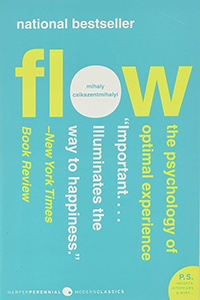
Mihaly Csikszentmihalyi, Flow: the Psychology of Optimal Experience
2008
The central theme of "Flow" revolves around the concept of "flow states," those moments when individuals are fully immersed in an activity, feeling a profound sense of focus, joy, and satisfaction. Csikszentmihalyi argues that these moments are the key to a fulfilled existence, and he presents a compelling case supported by extensive research and real-life examples.
Throughout the book, Csikszentmihalyi offers numerous insights into the conditions necessary for entering a flow state. He emphasizes the importance of setting clear goals, matching challenges to one's skills, and maintaining a state of focused concentration. These principles are applicable to various aspects of life, from work and creativity to leisure and relationships.
One of the most intriguing ideas he explores is the idea of control. He argues that paradoxical control in the context of "Flow" highlights the unique interplay between challenge and skill, demonstrating that individuals can experience a heightened sense of control when they willingly embrace activities that are just beyond their current level of expertise, as long as those challenges are still perceived as manageable and engaging. This concept underscores the complex and intricate nature of the flow experience as described in the book. Overall, this book provides a unique insight on focus and attention and provides practical ways for its readers to apply it.
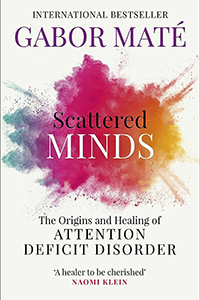
Gabor Maté, Scattered Minds: The Origins and Healing of Attention Deficit Disorder
2023
This book by former GP Physician Dr. Gabor Maté provides practical insights for those grappling with focus challenges. Maté's exploration of ADD's holistic origins, encompassing genetics, early experiences, and trauma, fosters self-awareness regarding the underlying causes. The book advocates a comprehensive approach, addressing psychological, emotional, and environmental aspects to manage triggers contributing to focus difficulties. Maté's emphasis on healing through compassion and nurturing relationships equips readers with strategies to enhance focus. By understanding these factors, the book empowers individuals to cultivate self-compassion, resilience, and a more focused mindset, facilitating practical steps towards improved attention.
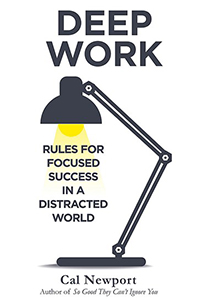
Call Newport, Deep Work: Rules for Focused Success in a Distracted World
2016
Most professionals should quit social media and we should all practice being bored. This self-help book, written by Cal Newport, professor of computer science at Georgetown University, is full of interesting anecdotes and useful tips that can help you with your concentration. According to him, being able to pay focussed attention to a mentally challenging task is almost a superpower in a competitive economy today. A superpower that is becoming less and less common and more and more important. He based the book on his successful blog 'Study Hacks', in which he introduced the term 'Deep Work'. For those who spend their entire working day in a whirlwind of emails, social media and short questions, Newport says it has the solution; a solution that can lead the reader to the true fulfilment of acquiring real skills.
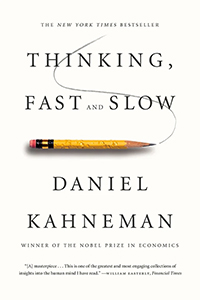
Daniel Kahnemann, Thinking, Fast and Slow
2012
In this book, Nobel laureate Daniel Kahneman summarizes a life's worth of research into human psychology and economics. He describes how our minds use two modes of thought - one fast and intuitive, the other slow and rational. He explains how this makes our thinking error-prone, and how it affects our decision-making. Building on this system, Kahneman goes even further to explain how people experience and remember happiness.
Kahneman's central claim is that humans are much less rational creatures than is often thought, because our minds use two systems for thinking and decision-making. The first system is designed for swift, intuitive and reflex responses, such as jumping away for a speeding car. The second system is designed for rational decision-making and complex and creative thought. However, because brains are 'lazy', the first system often takes precedence over the second, causing humans to make split-second decisions on important topics, where more systematic thought would be more appropriate.
Kahneman cites various examples and experiments that show how the two systems clash, and offers advice to activate the second system, allowing deeper, more creative and complex thinking. And building on these experiments, he shows what types of mistakes people make when deciding on large expenses, or creative projects. His types of experiments even allow him to make statements on experiencing and remembering happy moments, seeing the latter as much more important than the former: “I am my remembering self, and the experiencing self, who does my living, is like a stranger to me.”
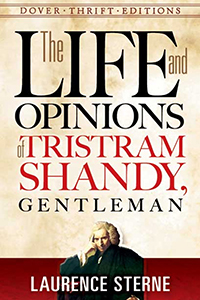
Laurence Sterne, The Life and Opinions of Tristram Shandy, Gentleman
1759
The Life and Opinions of Tristram Shandy, Gentleman by Laurence Sterne, published in installments between 1759 and 1767, is anything but a classic novel with a clear line. The author constantly loses himself in all kinds of digressions, to the great pleasure of the reader with whom Sterne's humor resonates, and to the annoyance of serious critics such as Dr. Johnson whose stern judgment – Nothing odd will do long. Tristram Shandy did not last.
Lack of foucus is a defect or perhaps even a sin in the other publications on this reading list, but in Sterne it is the primum movens of a very entertaining book, and therefore a virtue. The book presents itself as an autobiography of Tristram Shandy, but the main character is not born until book 3 and disappears completely from the picture in book 6 when he is a boy. After which three more books will follow.
Researchers have linked the fragmentary nature of Tristram Shandy to the 18th century interest in the remains of Pompeii and the unfinished (non-finito) in sculpture. But perhaps it is again too serious, and we should keep in mind Sterne's assessment of contemporaries who wanted to discover a serious meaning for his book: They all look too high – is ever the fate of low minds.
Contact us
Do you have questions about borrowing the books above? Is a book missing on this list, or would you like the UBL to purchase a book that is not yet available in our collections? Contact us via Ask a Librarian.
